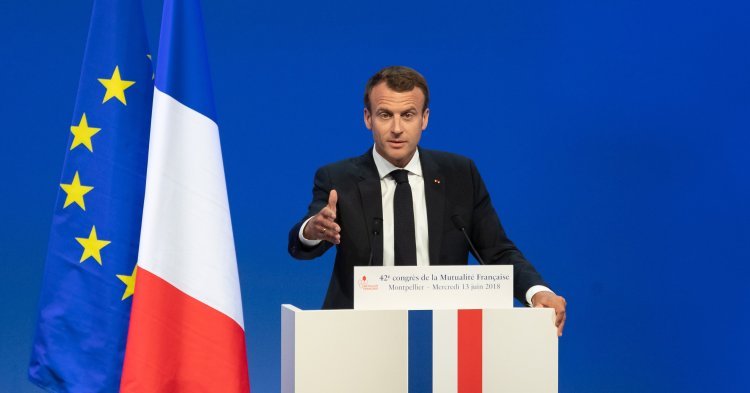As a result of these combined efforts, Macron is uniquely positioned to be the face of European diplomacy on thorny issues across the Middle East, such as the Gulf crisis—both because he has carefully maintained relationships with all major stakeholders and because other European leaders are too caught up in their own troubles to act as intermediaries. Theresa May can barely keep her own cabinet together—as illustrated by the recent resignation of three of her ministers within 24 hours. Italy’s new hard-line government is focused on controversial policies such as taking a census of Roma people, and German Chancellor Angela Merkel is too bogged down in internal problems, not to mention Germany’s non-interventionist tendencies.
Under previous administrations, Paris was quick to prioritise military solutions, such as intervening militarily in conflicts overseas – including in Libya, Mali and the Central African Republic. Macron, however, seems to have changed track and France is now asserting itself as a major European diplomatic force. The president swiftly reacted to the blockade of Qatar by urging the GCC officials to reconcile differences immediately after the crisis erupted, and by taking one of the most actives stances by communicating with both the Qatari emir and the Turkish President Recep Tayyip Erdogan the day following the blockade, and with King Salman of Saudi Arabia and Hassan Rouhani of Iran two days later.
A UN report referred to the blockade as “arbitrary” and particularly highlighted the thousands of mixed-nationality families the policy has separated, a concern Macron has stressed as well. Nevertheless, one year in, the blockade hasn’t hurt Qatar as much as the Saudi-led coalition had hoped. The emirate instead has set its sights on developing its domestic infrastructure and finding new trading partners, including closer ties with France.
Macron’s diplomatic efforts were ultimately rewarded: in September 2017, Paris became the Qatari emir’s first foreign destination since the blockade. In December 2017, Qatar and France agreed on some 12 billion euros ($14.13 bn) worth of deals that included Doha’s purchasing 12 more Rafale fighters, with an option to buy a further 36. Despite these ever-closer ties with Doha, Macron has carefully cultivated relationships with the other stakeholders in the Gulf crisis as well. Macron made a surprise visit to Saudi Arabia in November 2017, partly to urge Saudi Crown Prince Mohammed bin Salman to deescalate tensions with Lebanon and Iran.
Nor is the Gulf crisis an isolated example of Macron setting his hand to mediating a tricky dispute. He offered to intercede between Turkey and the Kurds. Despite Ankara rejecting this idea, the offer once again showcased Paris’ embrace of a more proactive diplomatic stance. The proclaimed openness pushes Macron further in refusing to close the door on Turkish membership in the EU.
Through two landmark summits in France, Macron has managed to get two rival Libyan leaders — Fayez al-Sarraj, the prime minister under the country’s weak, UN-backed government, and Khalifa Haftar, the military strongman who commands large portions of Libya’s east — to agree to call a ceasefire and hold elections in December. The agreement is an important first step in restoring stability to the country which has been mired in chaos since 2011. Paris reportedly increasingly perceives Haftar as the best hope to restore order and stamp out extremism in Libya. As with the Gulf crisis, Macron has kept up dialogue with all sides.
Macron’s strategy of dialogue is not unheard of in French politics, but rather consists of an upgraded version of the so-called “Gaullo-Mitterrandist consensus”, named after the foreign policy approach pursued by two former French presidents: Charles De Gaulle and François Mitterrand. It rests on three essential tenets: striving to maintain openness, forming strategic alliances with dominant powers, and upholding the nuclear deterrent.
From the beginning of his campaign, Macron saw the 21st century world as one full of both threats which needed to be neutralised and opportunities which needed to be embraced, and this philosophy has informed Macron’s policies as President. Macron’s administration adopted its version of the Gaullo-Mitterandist consensus after coming to a simple realisation: the world is transforming rapidly and, rather than pursuing a policy of isolation, France must remain open, engaged and continue defending French interests and acting forcefully abroad.
There have, of course, been some naysayers sceptical of Macron’s mediation. Some observers are not convinced the deadlines and promises he has secured will be kept, while others have called his proactive attempts in filling a diplomatic void in the Middle East opportunistic. But at a time when Washington has abdicated its responsibilities on the international stage and most of Europe is too caught up in domestic issues, Macron is filling an essential role. He is keeping the EU relevant in international politics.


Follow the comments: |
|
